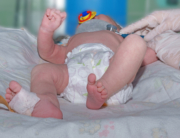If your child sustained a birth injury, you should explore the legal remedies available to help with current and future medical and personal care costs. Depending on the circumstances of the case, your child might need assistance for the rest of his life.
Your remedies will depend on the type of birth injury your child experienced. Neurological injuries get different legal treatment in Florida than all other kinds of birth-related injuries. Call the personal injury lawyers at Montero Law Center at 954-767-6500 for a free consultation to discuss your legal options and find out exactly what to prove in a birth injury lawsuit.
The Florida Birth-Related Neurological Injury Plan Statute
The Florida Statutes created the Florida Birth-Related Neurological Injury Compensation Plan to provide money for these claims, regardless of whether the doctor or medical facility committed medical malpractice.
The statute defines “birth-related neurological injury” as:
“injury to the brain or spinal cord of a live infant weighing at least 2,500 grams for a single gestation or, in the case of a multiple gestation, a live infant weighing at least 2,000 grams at birth caused by oxygen deprivation or mechanical injury occurring in the course of labor, delivery, or resuscitation in the immediate postdelivery period in a hospital, which renders the infant permanently and substantially mentally and physically impaired. This definition shall apply to live births only and shall not include disability or death caused by genetic or congenital abnormality.”
Proof Needed for the Birth-Related Neurological Injury Plan
An administrative law judge will determine whether your case meets the burden of proof, which means that:
- The injury is a type that the Compensation Plan addresses.
- A participating physician in a hospital or certified midwife in a teaching hospital supervised by a participating physician provided the obstetrical services in question.
Once we establish these two facts, the administrative judge will decide how much compensation you will get using the statutory guidelines.
What You Need to Know About the Birth-Related Neurological Injury Plan
Here are some of the crucial aspects of the Compensation Plan:
- The Plan applies to neurological injuries that occurred during labor, delivery, or immediate postdelivery resuscitation.
- The Plan is the exclusive remedy in these situations. No one is allowed to file a medical malpractice action or any other type of lawsuit for a Compensation Plan-covered birth injury.
- The only exception to the prohibition on filing medical malpractice claims or other lawsuits for Compensation Plan-covered birth-related neurological injuries is when you file such lawsuit before accepting an award of money from the Compensation Plan, and present clear and convincing evidence of bad faith, malice, or willful disregard for human rights and safety.
- The Compensation Plan prevents the child as well as the child’s personal representative, parents, dependents, and next of kin from suing anyone for the birth-related injury unless the facts fall within the exception, above.
What Your Award Can Include for a Birth-Related Neurological Injury
The administrative judge can award compensation for the actual amount paid for the following medically necessary and reasonable occurrences:
- Medical care
- Hospital bills
- Habilitative and training costs
- Family residential or custodial care
- Professional residential care
- Professional custodial care and services
- Drugs
- Special equipment
- Facilities
- Related travel
The judge will not award compensation for:
- Services or items the infant received or has a right to receive under state or federal law (unless federal law prohibits this exclusion),
- Services or items the infant received or should receive from any type of health or medical insurance, or
- Reimbursed expenses, whether the infant has already received the reimbursement or has a right to receive it.
All Other Birth Injury Claims
If your child’s birth-related injury does not fall within Florida’s Birth-Related Neurological Injury Compensation Plan, the typical remedy is to file a medical malpractice lawsuit against the person or facility whose negligence caused your child’s birth injury. Proving a medical malpractice claim is entirely different from proving a claim under the Birth-Related Neurological Injury Compensation Plan.
The Compensation Plan is a no-fault system. You do not even need to know how your infant sustained the injury, just that it happened under circumstances that the Compensation Plan covers.
Traditional medical malpractice law, however, requires you to prove these factors in a birth injury lawsuit:
- You had a doctor-patient relationship with the person who harmed your infant.
- The doctor violated the accepted standard of care of the medical community.
- The doctor’s failure to exercise the required level of care caused the harm to your infant.
Damages You Can Collect in a Birth Injury Medical Malpractice Lawsuit
The compensation will be different in every case because there are unique facts in each situation. Here are some of the economic losses we can pursue on your behalf:
- Your infant’s medical expenses that are the result of the birth injury
- The income you lost because of your child’s medical condition
- Your child’s expected future medical costs because of the birth injury
- Your child’s current assistance expenses that exceed those of a healthy child
- Reasonable estimated loss of earning capacity for your child
When there has been physical injury, we can also seek compensation for non-economic damages such as:
- Your infant’s physical pain
- Your mental anguish
- Loss of enjoyment of life
- Depression
Ways That the Defendant Will Try to Pay You Less Compensation
Medical malpractice claims are often high-dollar cases, so it is no surprise that the doctors’ and hospitals’ malpractice liability carriers (insurance companies) defend these lawsuits aggressively. Two of the common tactics the carriers use to try to pay you less money are to:
- Blame the victim. If the defendant can convince the judge that you were partly to blame for your child’s birth injury, the judge can reduce the amount of compensation you receive in proportion to your percentage of the total fault. Florida’s comparative negligence law allows you to recover some damages as long as the defendant doctor or hospital was also negligent.
- Caps on medical malpractice awards. Although the Florida Supreme Court declared the statutory limit on the amount of medical malpractice damages that a person can receive to be unconstitutional in 2017, the law is still on the books. Defendants might argue in favor of applying the caps, in hopes that the Supreme Court changes its mind.
How to Get Help for a Birth Injury Case
You do not need to stress about whether your child’s birth injury falls within Florida’s Birth-Related Neurological Injury Compensation Plan, or what kind of damages you can get. At the Montero Law Center, we sort out those issues for our clients. Just give us a call at 954-767-6500, and we will set up your free consultation to learn what to prove in a birth injury lawsuit. There is no obligation, and we do not charge legal fees until you win compensation.
 English
English  Español
Español 

